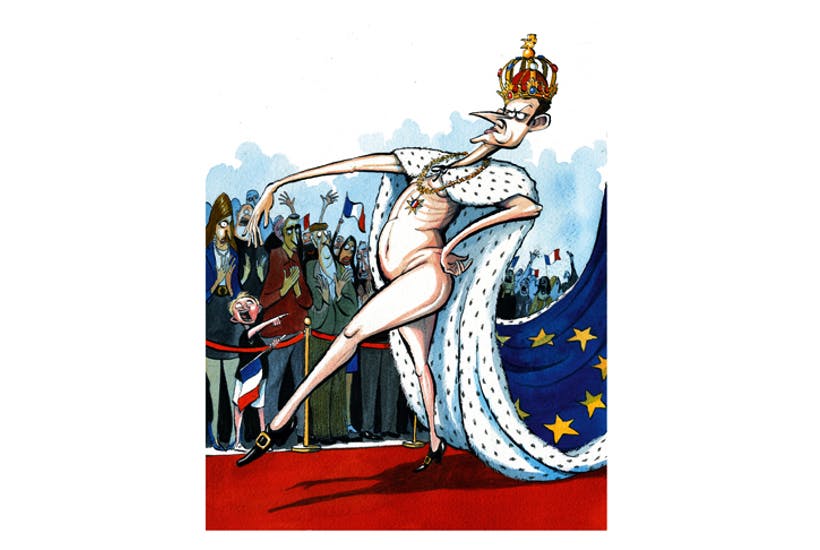On this week’s episode of The Spectator Podcast, we discuss whether France is voting for the lesser of two evils in Emmanuel Macron, consider whether Tim Farron made a mistake by bringing God into politics, and look at how the spread of Mayism across Britain could alter the Conservative party.
First, following Emmanuel Macron’s stunning victory in the first round of the French elections – taking a seemingly unassailable popularity into the run-off with Marine Le Pen – Jonathan Fenby considers, in this week’s magazine cover story, whether Macron is in fact headed for disaster. He joins the podcast along with Anne-Elisabeth Moutet, to discuss whether the 39-year-old sensation is all he seems. As Jonathan writes:
“The man who set up his own party to challenge the system, En Marche! (his own initials), is in fact a perfect insider-outsider. A graduate of the top administrative college, l’ENA, he made a fortune organising mergers and acquisitions for the Rothschild bank, earning €2.9 million in one takeover and getting the nickname of ‘the Mozart of finance’. In the seamless way of the French elite, he gravitated to the Elysée Palace as a Hollande adviser and became economics minister in 2014, lasting two years before resigning and setting his sights on returning as president of the republic. Macron, immaculately groomed, exudes confidence and seems to have an answer for everything, including the need not to make concessions to the UK over Brexit.”
And Anne-Elisabeth also thinks there’s more style than substance:
“This is somebody who’s never had a failure in his life, except not managing to get into a second top school – École normale supérieure – and that’s supposed to be a trauma. People tell you “no, he’s had failures in his life: he could not get into ‘normale'”. You know, it’s going to be interesting to watch, but it’s basically going to be Jacques Chirac dressed up as Barack Obama.”
Next, we turn our attention to a calamitous week for the Liberal Democrats. Tim Farron, their leader, was forced to explain his views on homosexual relationships, whilst David Ward, the former MP who was selected as their candidate for Bradford, was sacked after the party top brass remembered that they’d previously withdrawn the whip from Ward for perceived anti-Semitic comments. Damian Thompson and Nick Spencer, editor of the book The Mighty and the Almighty: How political leaders do God, sat down to discuss.
Damian had little sympathy for Farron:
“I think it’s very difficult to make religion absolutely central to your political philosophy and expect people to take you seriously. I’m sorry, I can’t help thinking there’s an element of ‘let’s make life difficult to this smug little pipsqueak’. So, even though the attacks on him are hypocritical, I can’t get too upset about it.”
Nick thinks that the attention might have been slightly unfair:
“It seems to have been a bit of a witch-hunt in the last week or so. It’s because he’s leader of the Liberal Democrats, of course. I don’t think many other politicians would have had quite the same scrutiny. I think some liberals feel he’s guilty of a kind of thought crime and want to hunt him out for that. It’s also because Theresa May, like Gordon Brown, they’re both cradle Christians. Tim Farron, I think, was baptised as an adult and I think we have a greater interest in those politicians who found God late on in life, one of the reasons we were so fascinated by Blair’s religion too.”
Finally, with the Conservatives on a seemingly unstoppable path to a significantly increased majority, James Forsyth considers in his column whether the political shape of the party is about to change. He joins the podcast along with Paul Goodman, former Tory MP and editor of ConservativeHome. As James writes, the biggest threat to Theresa May could be the lack of one:
“Considering that their party is expected to win by a landslide, the Tory spin doctors sound unusually panicked. They are keen to point out that the polls aren’t always right, and the pollsters are still trying to correct what they got wrong at the last general election. They insist that national voting tells you little about what will happen in the key marginal seats. These are normally the pleas of a party that is failing, and trying to persuade voters that it is still in the race. But Labour isn’t doing a good job of spinning its own prospects — so the Tories are doing it for them.”
On the shifting sands of Conservative ideology, Paul says:
“The polarity for them is appealing on the one hand to the kinds of voters they are making in-roads into people who are former Labour voters, former Ukip voters, people who on the whole have tended not to vote. They need them, that’s where they’re doing well. The problem they’ve got is with fired-up Remain type, Liberal Democrat flavour, voters. That’s why, I think, last week she repeated the pledge to spend 0.7% of GDP on overseas aid, because it matters to that type of voter.”
The Spectator Podcast will be appearing in its regular Thursday slot throughout the election campaign, but we’ll also be providing you with daily editions of Coffee House Shots, our political podcast, so do subscribe on iTunes to get our take on the latest twists and turns as soon as they happen.
This podcast is sponsored by Berry Bros. & Rudd, who have long supplied wine for The Spectator. If you’ve always wanted to start a wine cellar, 2017 could be the perfect time. Whether you are looking to buy for future drinking, for investment or a little of both, Berry Bros. & Rudd’s Cellar Plan is designed to suit all tastes and budgets. A personal Account Manager will be on hand to offer advice and assistance, and enable you to benefit from three centuries’ worth of relationships with the leading wine growers. To find out more about starting a wine cellar with Berry Bros. & Rudd, visit bbr.com/cellarplan










Comments